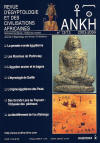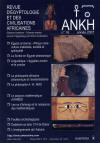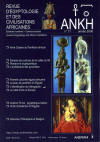|
ANKH n°12-13,
2003-2004, pp.
12-25.

ANKH n°16,
2007,
pp. 28-42.

ANKH n°16,
2007,
pp. 128-151.
ANKH n°17,
2008,
pp. 146-161.
 |
La pensée morale égyptienne du 3ème
millénaire avant l'ère chrétienne
Résumé :
La tradition classique occidentale fait
remonter la naissance de la science morale à la figure de
Socrate qui, à l’inverse des physiciens d’Ionie dont les
préoccupations étaient plutôt cosmologiques, aurait recentré la
réflexion philosophique sur l’homme et la cité, le bien et le
mal, la fin dernière, etc. Cette “révolution” socratique, selon
la tradition grecque elle-même, ferait suite à une sorte de
« révélation » faite par un oracle, l’oracle de Delphes, dont le
message délivré à Socrate tient en deux mots :
« Connais-toi
toi-même » ! L’auteur montre ici que l’essentiel de
l’enseignement socratique était déjà connu et pratiqué dans la
Vallée du Nil dès le troisième millénaire avant l’ère
chrétienne. En effet, un effort de réflexion sur la morale et
l’éthique a été pratiqué par les anciens Égyptiens notamment
autour de notions clés telles que le bien, le beau (nfr),
la perfection (nfrw) d’une part, et d’autre part le vrai,
le juste, l’équité, l’ordre cosmique et social… c’est-à-dire la
Maât, d’autre part. Il montre en particulier comment
toutes ces notions s’articulent entre elles, mais aussi avec
celle de la fin dernière, à travers notamment le tribunal
d’Osiris …
Abstract :
The Egyptian moral thought in the third
millennium before the Christian era.
-
For the classical western tradition, the birth of the moral
science dates back to the figure of Socrates, who, unlike the
physicists from Ion whose preoccupation were more cosmological,
would have refocused the philosophical reflecting on man and on
the city, the good and the evil, the end of life and so on. This
Socratic “revolution” according to the Greek tradition itself,
would have followed upon a sort of revelation from an oracles,
the oracles of Delphi, whose message delivered to Socrates takes
up in two words « know thyself ». The author shows here that the
essential points of Socrates’ teaching was already known and
practised in the Nile Valley as soon as the third millennium
before the Christian era. Indeed, an effort to reflect about
moral and ethic was practised by the ancient Egyptians, around
some key notions such as the good, the beautiful (nfr)
the perfection (nfrw) on the one hand, and on the other
the true, the exactness, the equity, the cosmic and social
order…….. that is to say the Maât. He shows in
particular how all these notions are linked together, but also
with that of the end of life particularly through the court
of Osiris.
Le scribe dans l’Égypte ancienne
Résumé :
A partir des figures d’Imhotep et d’Hésirê, scribes royaux de la
IIIème dynastie pharaonique, (vers 2650 avant J.C.), cet article
esquisse un aperçu du statut de la science et des savoirs dans
l’Égypte ancienne. Il expose ensuite, à partir des sources
disponibles, l’étendue des connaissances que devaient maîtriser
les scribes, l’élite intellectuelle de cet État, le premier dans
l’histoire de l’humanité. Pour finir, il propose la prise en
compte de cette dimension intellectuelle dans la définition
habituelle du terme “scribe”, qu’il conviendrait désormais de
remplacer par celui de “savant ”.
Ancient Egypt’s Scribes
Abstract :
Ancient Egypt’s Scribes - From notorious
names recorded in history such as Imhotep and Hesire, two great
royal scribes during the IIIrd dynasty (ca. 2650
B.C.), this paper presents an overview of the key position of
science and precise knowledge within Ancient Egyptian society
and, on the basis of primary sources available, the author gives
in detail an impressive account of the range of knowledge that
Egyptian scribes and the intellectual elite should have to
conquer and master. Finally, rating the intellectual magnitude
in Ancient Egyptian society, the author is proposing to replace
the term “scribe” by that of “scientist” in our modern
translations of the Egyptian word “sesh”.
Anthony
William AMO : sa vie et son œuvre
Résumé :
Cet article revient sur l’extraordinaire
trajectoire d’un jeune africain kidnappé sur les côtes du Ghana
actuel et transporté en Hollande au début du 18ème
siècle.
Anthony William Amo
(c. 1703-1758), élevé ensuite dans une cour
princière en Prusse, étudiera, entre autres, la philosophie
avant d’enseigner cette discipline dans les universités de
Wittenberg, Halle et Iéna en Allemagne. Au-delà de l’aspect
proprement biographique de
Amo,
l’auteur esquisse ici une présentation de l’œuvre de ce
philosophe méconnu.
Antony
William AMO : his life and work
Abstract :
In
Francophone speaking African areas A. W. Amo (c.
1703-1758) is generally ignored and untaught. This situation
explains why this paper is focusing again on Amo’s life and work
from Ghana in West Africa to the Netherlands and the Court of a
German prince (Duke Anton Ulrich). A.W. Amo mastered
German, Dutch, French, Latin, Greek, and Hebrew, and became
adept at Law, Philosophy, and Medicine. He is best known as a
professor of Philosophy at the universities of Halle, Jeana, and
Wittenberg during the 18th century.
Summary:
This article, a tribute to Victor Schoelcher’s principled
commitment to the abolition of the slave trade and the
enslavement of Black people, also highlights an important but
little-known aspect of his campaign: he drew attention to the
dignity and the ancient cultural heritage of the Back
people — something few thinkers, even within abolitionist circles,
were inclined to admit at that time. It was precisely Victor Schoelcher’s principal merit that by acknowledging the Black
African origin of ancient Egypt’s pharaonic civilization, he had
the courage to make this cultural argument an integral part of
his case for the abolition of slavery in 1848.
|

